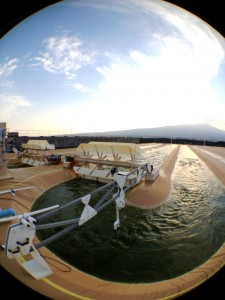Super-light body armor? Add it to the list of things algae can make.
Over at Gizmodo Eric Limer describes recent research reported at the National Meeting & Exposition of the American Chemical Society about incredibly light, and strong, nanocellulose materials that are made from algae. Eric writes:
“Initially, the production of nanocellulose involved huge breeding tanks of bacteria, which rather annoyingly required things like food. But recent advancements have helped groom a new workhorse: blue-green algae, which unlike normal bacteria, can make its own food from the sun, and devour greenhouse gases in the process. You could hardly ask for more.”


